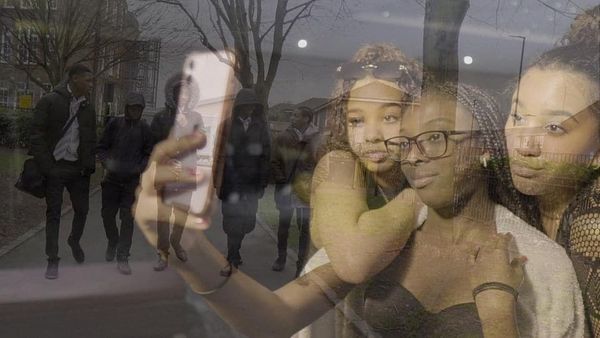Eye For Film >> Movies >> Blacks Can't Swim: Rewind (2022) Film Review
Blacks Can't Swim: Rewind
Reviewed by: Jennie Kermode

Every year, there are around 400 accidental drowning deaths in the UK. There are many more non-fatal incidents, which can leave people with lasting injuries including brain damage, and often prompt the development of phobias and other symptoms of ongoing trauma. Proportionate to their numbers in society, Black and Asian people are significantly over-represented amongst these casualties, for a simple reason: the vast majority of them have never learned how to swim.
In 2020, musician Ed Accura made the documentary A Film Called Blacks Can’t Swim to chronicle his own journey towards learning to swim as an adult. He followed it up a year later with Blacks Can’t Swim: The Sequel, looking at other people’s stories, and such was the response to the two films that this situation, which few people wanted to talk about before, has already begun to change. Here he returns to the subject for a third time in order to address the generational aspect of the problem and try to find ways of breaking the cycle in which parents not swimming means that kids never learn.

As in his previous works, Accura (producing, with Mysterex at the helm) approaches the film as a mixture of drama and documentary, and as in those, the former element is significantly weaker than the latter. There are reasons for this, however, as he has deliberately chosen to use non-professional actors in order to give opportunities to young people, and he has found that this blended approach is highly effective in connecting with his target audience. What may fall a little short as cinematic art can still be good communication.
It is immediately apparent on watching this that it’s more than just an entry in another drawn-out franchise. There’s still a vast amount of material to explore, and a lot of questions waiting to be addressed. The fictional stories (based on real events) follow two young people with different problems and act as entry points for discussion. In one, a teenage boy discovers that not being able to swim limits his career opportunities, raising the point that swimming is a life skill, not just a survival skill or something people do for fun. In the other, a teenage girl who is already a capable swimmer contemplates dropping out of her sport, opening up conversations about the reasons why some young people give up on swimming, and the lack of role models available to them.
The challenges of looking after afro hair factor heavily into some of these discussions. One woman explains how she became adept at securing plastic bags around her head to protect hers. What might seem trivial to people who can’t directly relate to the problem is a big deal for teenagers facing intense social pressure related to their looks or for people trying to fit in with white ideas of what it means to look professional and smart. Other ideas come into play elsewhere, such as the notion that black people have denser bones so can’t stay afloat – one of those things which seems unlikely but has never been scientifically disproven, and which makes people nervous about giving swimming a try.
The film draws comparisons between swimming and football, for which there is no shortage of community enthusiasm and support. It’s easy for young people to play the game recreationally and to imagine (albeit unrealistically in most cases) having careers in it. Interwoven between the drama and documentary elements are ideas about why this is perceived so differently. Meanwhile, Mysterex examines generational fears around water and looks at what might be done to reach kids whose parents are unable to provide them with swimming skills.
A highly practical film which doesn’t try to hide the fact that its primary function is to educate, Blacks Can’t Swim: Rewind is strongly rooted in community and features some great interviews with ordinary people addressing their peers. It’s a different kind of filmmaking from what we typically see in cinemas, but no-one should doubt its importance.
Reviewed on: 30 Jun 2022

















